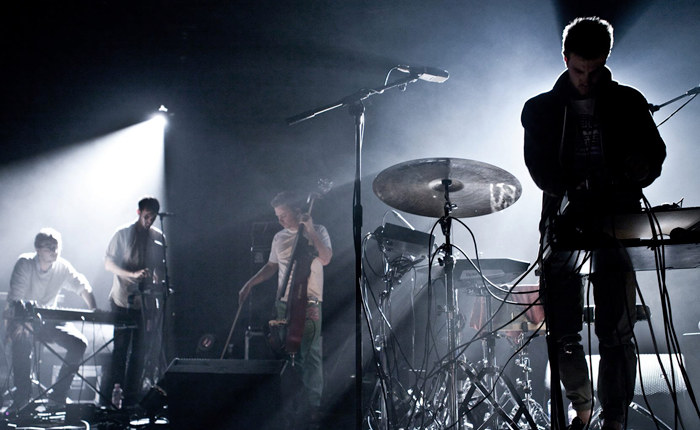Portico Quartet [Live]
BY GEORGE TOWNSEND
MONDAY, 28TH OCTOBER 2013
It’s about 7:30 in the evening and here I am, chatting and shivering outside Oxford’s Newman Rooms, a building usually used for holding Catholic mass, just south of the city centre. As we walk in, passing through an oddly clinical, low-ceilinged atrium, I’m struck by how much of a treat it is to be seeing Portico Quartet play in a place like this: a large, modern hall, the front fitted with a cross and alter, and the walls adorned with images of saints and paintings of biblical scenes. But the quickly growing audience, who have spread themselves across the floor of the hall in little clusters, aren’t facing the way the congregation usually would. In fact, the band’s setup and that of their support act (Oxford’s own After The Thought) is at the western end of the hall, giving them a greater length of the rectangular space to play to, but also positioning them in front of an enormous painting of Christ and ‘doubting Thomas’ that hangs from the ceiling from two thick black chains. Christ stands at a window, sunlit Jerusalem outside, his arm raised, bearing that fifth stigmata, as Thomas extends a quivering finger and sticks it in.

After The Thought is the project of Matt Chapman Jones, who plays a guitar, an array of pedals and a laptop. He kicks off the evening with a sample of his own brand of ambient electronica, à la Emeralds. That said, somehow Matt’s sound has a more distinctly British twist than that of those recently disbanded Canadians (Aphex Twin’s Selected Ambient Works 85-92 springs to mind as a reference point). And maybe ‘kicks off’ isn’t quite the right phrase either; there are louder, more aggressively noisy moments in the set, but it begins unassumingly, without announcement, and those louder moments have a tendency to creep up on you, still ambient rather than confrontational. It’s all instrumental - no singing or vocal samples - and largely pretty engrossing. There were a few hairy moments when the equipment misbehaved, but overall After The Thought was a great choice for the opening slot, and a fitting pre-amble to the DMC we were all about to have.
Portico Quartet opened with ‘Window Seat’. There’s something personal about this tune, so much so that it almost felt incongruous played out in front of a big group of people. But again I had that sense that this was a treat, hearing songs usually listened to in solitude, being played live to such a receptive crowd. As with the rest of their set, apart from (excitingly) a couple of new ones, ‘Window Seat’ is taken from the quartet’s latest, self-titled album, a record that marks a bold departure from their background in the jazz scene. Though much of the old live instrumentation is still there (drums, double bass, saxophone, hang), various keyboards and other bits of electronic kit now interact with the acoustic elements to create a vibrant and evocative sound.
Throughout the show, the band only stops for a break a couple of times between songs and to introduce Cornelia, who sings on the new ones and on the song played as an encore, ‘Steepless’; for the most part, the set flows from one track to the next, as the band members bob their heads, and occasionally glance up at the audience or at the painting that looms out of the darkness behind them. The new tracks follow on in a similar vein to the material on Portico Quartet, but with a bit more intensity, agitation even. The layering of the various sounds and rhythms is a bit denser, Cornelia’s vocals more urgent than meditative, and there’s a even an electric guitar being played by bassist Milo Fitzpatrick. Not quite as radical a shift as that between their earlier albums and the latest, then, but exciting stuff, still. As a friend commented when the gig was over, those new ones could be massive.
The highlight for me was ‘City of Glass’, not a track that featured Cornelia (as apt and elegant as her Björk-like contributions always are), but one that nonetheless showed the band to be at the top of a game for which they themselves have made the rules. It’s not quite jazz anymore, and it’s not just electronica, and nor is it any longer purely instrumental. But then, why should it be?
By George Townsend.